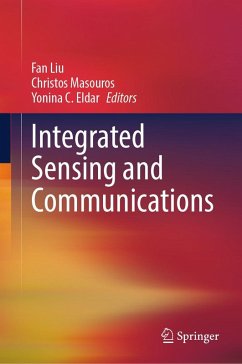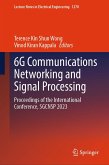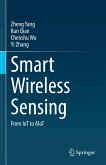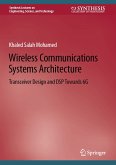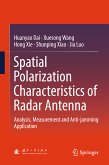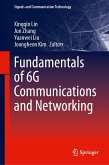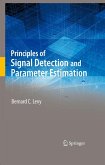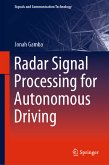Fan Liu is currently an Assistant Professor of the Department of Electronic and Electrical Engineering, Southern University of Science and Technology (SUSTech), China. He received the Ph.D. and the BEng. degrees from Beijing Institute of Technology (BIT), Beijing, China, in 2018 and 2013, respectively. He has previously held academic positions in the University College London (UCL), UK, first as a Visiting Researcher from 2016 to 2018, and then as a Marie Curie Research Fellow from 2018 to 2020. Dr. Fan Liu's research interests lie in the general area of signal processing and wireless communications, and in particular in the area of Integrated Sensing and Communications (ISAC). He has 10 publications selected as IEEE ComSoc Besting Readings in ISAC. He is the Founding Academic Chair of the IEEE ComSoc ISAC Emerging Technology Initiative (ISAC-ETI), an Associate Editor for the IEEE Communications Letters and the IEEE Open Journal of Signal Processing, and a Guest Editorof the IEEE Journal on Selected Areas in Communications, IEEE Wireless Communications, and China Communications. He was also an organizer and Co-Chair for numerous workshops, special sessions and tutorials in flagship IEEE/ACM conferences, including ICC, GLOBECOM, ICASSP, and MobiCom. He is the TPC Co-Chair of the 2nd and 3rd IEEE Joint Communication and Sensing Symposium (JC&S), and will serve as a Symposium Co-Chair for the IEEE GLOBECOM 2023 and IEEE WCNC 2024. He is a Member of the IMT-2030 (6G) ISAC Task Group. He was the recipient of the 2022 First Prize of Science and Technology Progress Award of China Institute of Communications, 2021 IEEE Signal Processing Society Young Author Best Paper Award, the 2019 Best Ph.D. Thesis Award of Chinese Institute of Electronics, the EU Marie Curie Individual Fellowship in 2018, and has been named as an Exemplary Reviewer for IEEE TWC/TCOM/COMML for 5 times. Dr. Liu was listed in the World's Top 2% Scientists by Stanford University for citation impact in 2021 and 2022. Christos Masouros received the Diploma degree in electrical and computer engineering from the University of Patras, Greece, in 2004, and the M.Sc. by Research and Ph.D. degrees in electrical and electronic engineering from The University of Manchester, U.K., in 2006 and 2009, respectively. In 2008, he was a Research Intern with Philips Research Laboratories, U.K. From 2009 to 2010, he was a Research Associate with The University of Manchester and a Research Fellow with Queen's University Belfast from 2010 to 2012. In 2012, he joined University College London as a Lecturer. He is currently a Full Professor with the Information and Communication Engineering Research Group, Department of Electrical and Electronic Engineering, and affiliated with the Institute for Communications and Connected Systems, University College London. He held a Royal Academy of Engineering Research Fellowship from 2011 to 2016. His research interests include the field of wireless communications and signal processing with particular focus on green communications, large-scale antenna systems, communications and radar coexistence, and interference mitigation techniques for MIMO and multicarrier communications. He was a recipient of the Best Paper Awards at the IEEE GlobeCom 2015 and IEEE WCNC 2019 Conferences, and has been recognized as an Exemplary Editor of the IEEE Communications Letters and an Exemplary Reviewer of the IEEE Transactions on Communications. He is an Editor of IEEE Transactions on Communications, IEEE Transactions on Wireless Communications, and the IEEE Open Journal of Signal Processing and an Editor-at-Large of IEEE Open Journal of the Communications Society. He has been an Associate Editor of IEEE Communications Letters and a Guest Editor of IEEE Journal on Selected Topics in Signal Processing issues "Exploiting Interference Towards Energy Efficient and Secure Wireless Communications" and "Hybrid Analog/Digital Signal Processing for Hardware-Efficient Large Scale Antenna Arrays." He is a member of IET. He is an Elected Member of the EURASIP TAC Signal Processing for Communications. He is a Founding Member and the Vice-Chair of the IEEE Special Interest Group on Integrated Sensing and Communications, and the Chair of the IEEE Special Interest Group on Energy Harvesting Communication Networks. Yonina C. Eldar received the B.Sc. degree in physics and the second B.Sc. degree in electrical engineering from Tel-Aviv University, Tel-Aviv, Israel, in 1995 and 1996, respectively, and the Ph.D. degree in electrical engineering and computer science from the Massachusetts Institute of Technology (MIT), Cambridge, MA, USA, in 2002. She is currently a Professor with the Department of Mathematics and Computer Science, Weizmann Institute of Science, Rehovot, Israel. She was previously a Professor with the Department of Electrical Engineering, Technion, Haifa, Israel.She is also a Visiting Professor with MIT, Visiting Scientist with Broad Institute, Cambridge, and an Adjunct Professor with Duke University, Durham, NC, USA. She was a Visiting Professor with Stanford. She is author of the book Sampling Theory: Beyond Bandlimited Systems and co-author of five other books published by Cambridge University Press. Her research interests include statistical signal processing, sampling theory and compressed sensing, learning and optimization methods, and their applications to biology, medical imaging and optics. Dr. Eldar was the recipient of many awards for excellence in research and teaching, including the IEEE Signal Processing Society Technical Achievement Award in 2013, IEEE/AESS Fred Nathanson Memorial Radar Award in 2014, IEEE Kiyo Tomiyasu Award in 2016, Michael Bruno Memorial Award from the Rothschild Foundation, Weizmann Prize for Exact Sciences, Wolf Foundation Krill Prize for Excellence in Scientific Research, Henry Taub Prize for Excellence inResearch (twice), Hershel Rich Innovation Award (three times), Award for Women with Distinguished Contributions, Andre and Bella Meyer Lectureship, Career Development Chair at the Technion, Muriel & David Jacknow Award for Excellence in Teaching, and Technion's Award for Excellence in Teaching (two times). She was also the recipient of the best paper awards and best demo awards together with her research students and colleagues, including the SIAM outstanding Paper Prize, UFFC Outstanding Paper Award, Signal Processing Society Best Paper Award and the IET Circuits, Devices and Systems Premium Award, was selected as one of the 50 most influential women in Israel and in Asia, and is a highly cited Researcher. She was a Member of the Young Israel Academy of Science and Humanities and Israel Committee for Higher Education. She is the Editor in Chief of Foundations and Trends in Signal Processing, a member of the IEEE Sensor Array and Multichannel Technical Committee, and serves on several other IEEE committees. In the past, she was a Signal Processing Society Distinguished Lecturer, Member of the IEEE Signal Processing Theory and Methods and Bio Imaging Signal Processing technical committees, and was an Associate Editor for the IEEE Transactions On Signal Processing, EURASIP Journal of Signal Processing, SIAM Journal on Matrix Analysis and Applications, and SIAM Journal on Imaging Sciences. She was the Co-Chair and Technical Co-Chair of several international conferences and workshops. She was a Horev Fellow of the Leaders in Science and Technology Program, Technion, and an Alon Fellow. She is a Member of the Israel Academy of Sciences and Humanities (elected 2017) and EURASIP Fellow.
Background, Motivation, Applications, and Preliminaries for ISAC.- Fundamental Limits for ISAC - Communication Perspective.- Fundamental Limits for ISAC - Radar Perspective.- Fundamental Limits for ISAC - Localization Perspective.- Fundamental Limits for ISAC - Asymptotic Analysis.- PHY Tradeoff and Resource Allocation for ISAC.- Sensing-Centric ISAC Signal Processing.- Communication-Centric ISAC Signal Processing.- Joint ISAC Signal Processing.- ISAC Receiver Design.- MmWave and THz ISAC Signal Processing.- Radar-Communication Spectrum Sharing.- Perceptive Cellular Network.- (Device-Free) Sensing-Assisted Communications.- Wi-Fi Sensing.- Automotive ISAC: V2I Networks.- Automotive ISAC: V2V Networks and SLAM.- Security and Privacy in ISAC.- Full-duplex ISAC.- ISAC RF Front-End Design.- ISAC With Emerging Communication Technologies.

